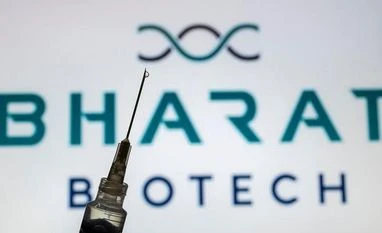After Bharat Biotech International’s Monday announcement of its Covid intranasal vaccine iNCOVACC (BBV154) receiving the Central Drugs Standard Control Organisation approval as heterologous booster dose under restricted use in emergency situation for ages 18 and above in India, the Hyderabad-headquartered biotechnology company is scouting for global partners to manufacture and distribute the world’s first non-invasive needle-free vaccine.
The company has started production of iNCOVACC in India, but is slow to ramp up in the absence of demand.
“There is demand from the private market (for this vaccine) as a booster shot. Production is continuing, but deployed capacity is limited due to lack of demand,” informs a company source.
The only other vaccine approved as a heterologous (mix-and-match) booster - Corbevax - has not seen much demand either.
Sources also indicate that the company is open to having partners to take this vaccine global.
“We are looking for global partners - both for manufacturing and distribution,” says a source. This, he says, will help Bharat Biotech commercialise the vaccine faster in other geographies.
Since the intranasal vaccine is easier to administer and does not require trained vaccinators, it will be accepted in low- and medium-income countries with low vaccine penetration.
Bharat Biotech has set a 1-billion-dose annual capacity target in India.
“We are scaling up manufacturing of the intranasal vaccine now. The target is 1 billion annual doses for the nasal vaccine,” says a source, quoted earlier.
The vaccine developer has already established large manufacturing capacities at multiple sites across India - Gujarat, Karnataka, Maharashtra, and Telangana.
Since the intranasal vaccine is based on the viral vector platform, there will be no production scalability issues that had plagued Covaxin. Covaxin (inactivated virus vaccine) had issues in scaling up due to low yields.
While the demand for booster doses in India has been low - picking up only during the 75-day free precaution dose campaign by the Centre - experts feel the intranasal vaccine holds out promise for reducing transmissibility.
At the moment, even if the circulating Sars-CoV-2 virus does not trigger serious infection, it remains highly contagious. On testing positive, one still has to quarantine, or risk infecting those who are susceptible. China’s zero-Covid policy has led to frequent lockdowns and unrest in the country.
Experts feel this vaccine may change that as it will reduce transmission. The vaccine will induce local (mucosal) immunity at the point of entry of the virus.
Jacob John, senior virologist and former head of the departments of clinical virology and microbiology at Christian Medical College, Vellore, tells Business Standard that the incubation period of the Sars-CoV-2 virus is declining with every new variant.
“Now it is down to three days. For the memory of immunity to kick in and raise one’s antibody level, it takes five to six days. That is why we have annual flu shots, so that there is a periodic boost to our antibody levels and some spillover antibodies on the nasal mucosa,” explains John.
The flu virus has one and a half-day incubation period. John adds that the same principle applies to the Omicon and its sub-variants as well. As a booster, one will need to take the intranasal vaccine periodically.
This opens up a potential market for the iNCOVACC. The other intranasal vaccine project that may benefit India is being developed by Codagenix, and will be manufactured by Pune-based Serum Institute of India (SII). Data from the trials are expected only next year.
Meanwhile, the demand for boosters remains low.
Apart from iNCOVACC, Biological E’s Corbevax is the only other vaccine approved for mix-and-match boosting. SII’s Covishield and Covaxin are being used as homologous boosters.
So far, about 73.7 million doses of Corbevax have been administered in the country, according to CoWIN data.
Biological E had said earlier this month that “approximately 74 million doses of Corbevax have been administered to children in India and almost 33 million kids have completed the two-dose primary vaccination...” This implies that almost all the doses given have been to adolescents and there’s been not much demand for boosters.
The chief operating officer (COO) of a private hospital in Mumbai says there is little to no demand for paid boosters, and there could be some demand for the intranasal vaccine at outpatient clinics, but not so much in a hospital setting.
“We are in a wait-and-watch mode. Hospitals have trained vaccinators, and thus administering any vaccine is fine. Since the intranasal vaccine is easy to administer, we feel it may see some traction at doctor clinics,” says the COO, adding his hospital has not placed any orders yet for the vaccine.
- With inputs from Ishaan Gera in New Delhi
Unlock 30+ premium stories daily hand-picked by our editors, across devices on browser and app.
Pick your 5 favourite companies, get a daily email with all news updates on them.
Full access to our intuitive epaper - clip, save, share articles from any device; newspaper archives from 2006.
Preferential invites to Business Standard events.
Curated newsletters on markets, personal finance, policy & politics, start-ups, technology, and more.
)